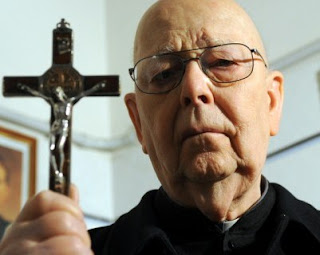Father Gabriele Amorth In an interview for the Italian blog Stanze Vaticane , the Vatican's Chief Exorcist, Father Gabriele Amorth, answered questions about his soon to be beatified mentor, the persecution of Christians by ISIS, and why a loving God would allow the existence of Hell. (I have highlighted in red Fr. Amorth’s most profound observations about the devil and the nature of evil.) Father Amorth we are going through a time of violence and persecution against Christians by ISIS: Is the hand of the devil behind it? Ah, to be sure! Where there is evil there is always the devil. He always is, where there is evil, any evil, great or small, it is always at the suggestion of the devil. These people are manipulated by Satan then ? ISIS, Sure, I am convinced of it. Where there are wars and destruction, behind these, there is always the devil laughing. God would never allow it. God wants only good things. And these people would also shoot the Pope without qualms... [





